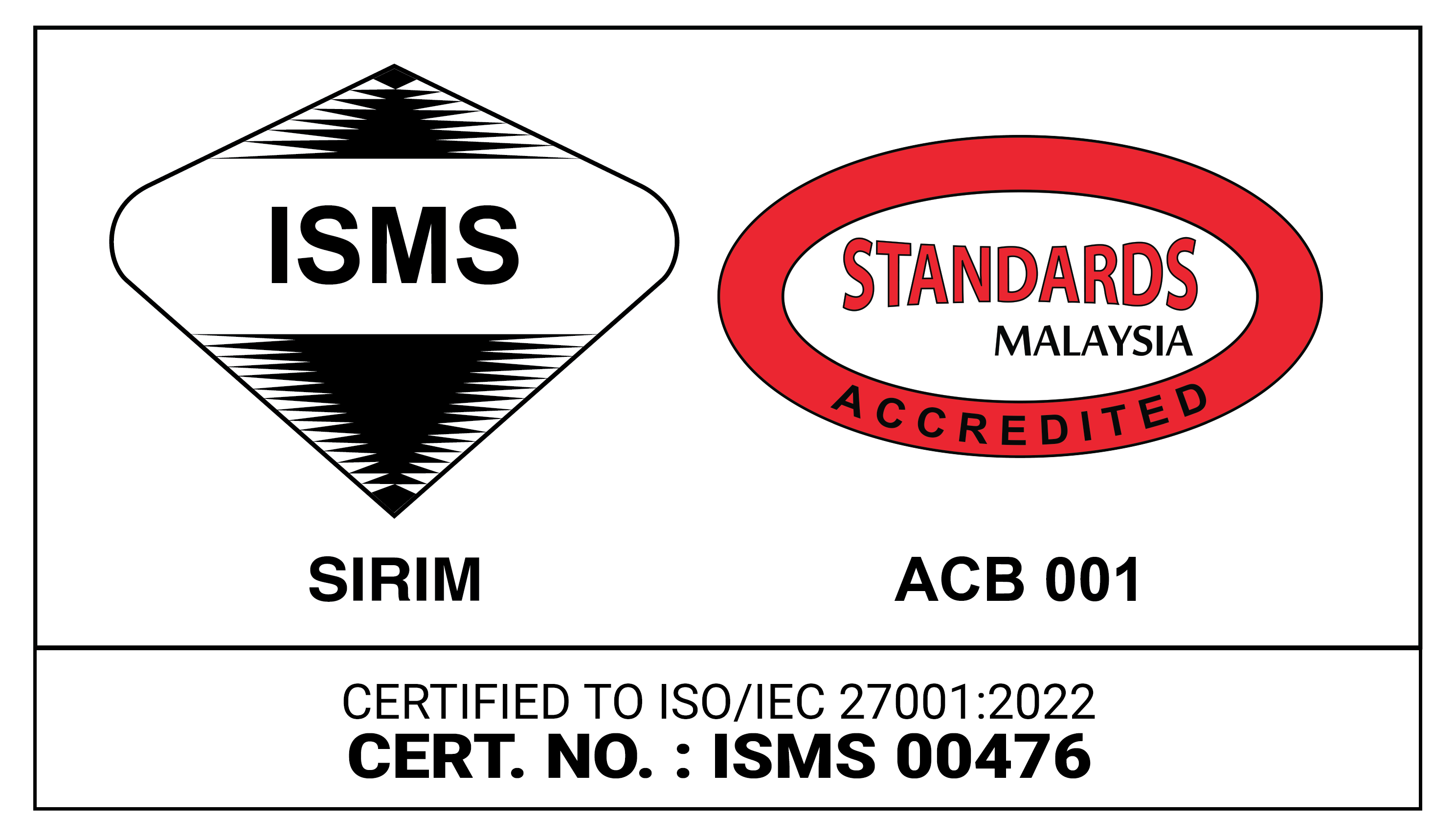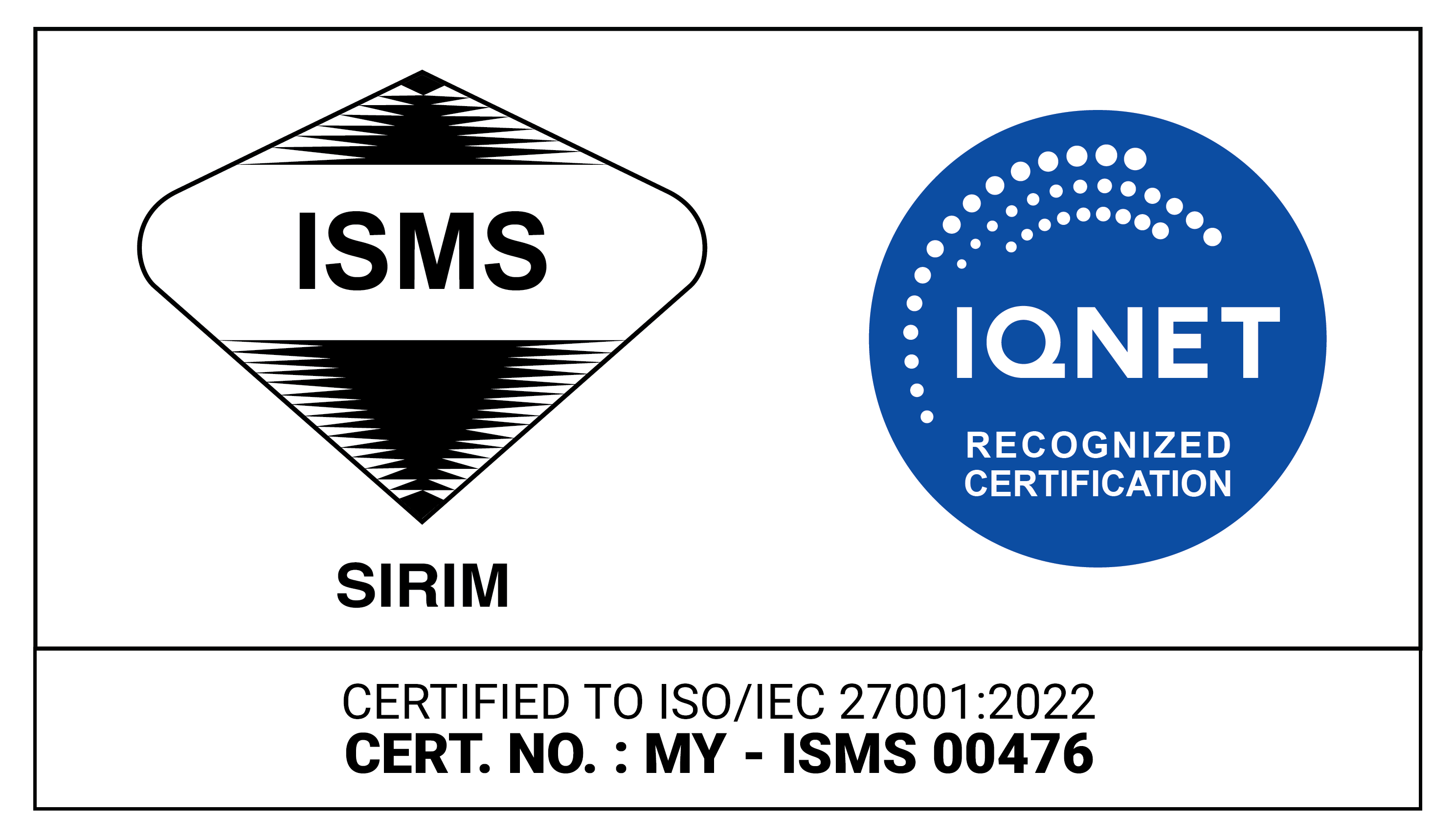The Biofuel Industry in Malaysia started in the 1980s. Malaysian Palm Oil Board (MPOB) started the R&D of biodiesel from palm oil and its products. Laboratory-scale research started after the R&D laboratory was successfully established in 1982. In July 1983 the Palm Biodiesel Steering Committee was formed under the Ministry of Primary Industries - KPU (now known as the Ministry of Plantation and Commodities - KPK) to oversee the direction and research and development programs of palm biodiesel. MPOB developed a pilot plant in 1985 in collaboration with PETRONAS to produce biofuel from palm-based. The first palm biodiesel pilot plant in the world in 2 November 1986 was launched by YAB Dr Mahathir Mohamad, Prime Minister of Malaysia. Palm biodiesel (Palm Methyl Ester) was produced for engine research and field research for 8 years from 1986 to 1994. The results of the study were positive and very encouraging. In August 2002, the palm oil biodiesel technology produced by MPOB was successfully commercialized for domestic use.
NATIONAL BIOFUEL POLICY (NBP) In recognition of biodiesel’s environmental and economic benefits by reducing greenhouse gases (GHG) emissions and fossil fuel dependency, the Malaysian Government launched the National Biofuels Policy (NBP) in March 2006. The policy is based on 5 cores :
The main objective of NBP development is : MALAYSIA PALM OIL BOARD (MPOB) MPIC is collaborating with Malaysia Palm Oil Board (MPOB) to pioneer researches and implementation of the National Biodiesel Programme to a higher level. A special group of biodiesel researchers coordinated by Energy & Environment Unit, Engineering & Processing Division, MPOB is conducting various RnD starting from 1986 before National Biofuel Policy and Malaysian Biofuel Industry Act 2007 being developed.
BIOFUEL DIVISION SERVICES (1) Review and formulate policies Review and formulate policies related to the biofuel industry, including reviewing legislation and regulations related to the biofuel industry. (2) Encourage industry development Encourage the development of the biofuel industry, including providing advisory services to individuals or organizations that will venture into the biofuel industry. (3) Register and Issue Licenses Register and issue licenses for activities such as building plants, producing, blending, exporting, transporting, storing, measuring and testing biofuels (4) Regulate industry Regulate the biofuel industry, particularly implementing enforcement involving aspects including intelligence, monitoring, arrests, operations, investigations, prosecutions and compounding (5) Data maintenance and analysis Record and maintain a database of information obtained from the licensing of all activities related to biofuels. ACT AND REGULATIONS
MALAYSIAN BIOFUEL INDUSTRY ACT The Malaysian Biofuel Industry Act 2007 (Act 666) is a legal instrument to regulate the country's biofuel industry and provides for the mandatory use of biofuels, licensing of activities related to biofuels and related matters. BIOFUEL INDUSTRY REGULATIONS Regulations under the Malaysian Biofuel Industry Act 2007 (Act 666) are as follows: Malaysian Biofuel Industry (Licensing) Regulations 2008 - PU(A) 404 Malaysian Biofuel Industry (Blending Percentage and Mandatory Use) Regulations 2019 – PU(A) 27 STANDARD AND WARRANTIES NATIONAL BIODIESEL PROGRAMME
LAND TRANSPORT AND INDUSTRY In recognition of biodiesel’s environmental and economic benefits, Malaysia has mandated biodiesel use through regulations on land transport and industry. The biodiesel programme was implemented in phases, starting with the B5 biodiesel programme (blends of 5% palm biodiesel with 95% petroleum diesel) for the land transportation sector in June 2011. The programme was later upgraded to B7 and implemented across the country in December 2014, followed by the B10 biodiesel programme in 2019. Targeted B20 biodiesel programme implementation started in 2020, with phased nationwide rollout planned subject to infrastructure readiness. In July 2019, mandatory B7 blending was introduced for the industrial sector, with exemptions for the power generation, maritime and bunkering sectors. The B30 biodiesel programme is planned for implementation by 2030. However, the B30 biodiesel programme rollout could start earlier if sufficient technical data has been acquired. Beyond the B30 biodiesel programme, renewable hydrocarbon fuel or palm-based HVO could be introduced in future.
DEVELOPMENT OF BIOFUEL PROGRAMME IN MALAYSIA WAY FORWARD FOR PALM BIODIESEL The government will take a three-pronged approach to maximise available biodiesel production capacity and consumption for the land transport and industrial sector: growing domestic demand, expand exports, and increase competitiveness. In parallel, R&D will be undertaken, and pilot programmes will be implemented to develop solutions for Marine and Aviation biofuels.
BIOFUEL LICENSING BIOFUEL LICENSING ACTIVITIES The activities licensed as stated in Section 5 of Act 666 are as follows: Biofuel Production Category: Biofuel Business Category: Biofuel Services Category: An interested party who run any biofuel activities are required to have a valid license. License application must be made in writing to the Biomass and Biofuel Division (BBA), Ministry of Plantation and Commodities (KPK). The applicant's company, including the new applicant, is required to submit the license application form as follows: Applicants are advised to fully understand the Guidelines on Biofuel Licensing to ensure that all license conditions are complied with before submitting the application form. Forms submitted electronically or faxs will be reviewed in advance by the secretariat. If the application submitted is complete, the original application form must be printed, and signed by the applicant. Applicants are also required to submit any further documents or information required by the secretariat if requested to do so. Applications will be reviewed based on prescribed application criteria as well as the application form checklist. Applications must be submitted in hard copy to KPK through the following address Under Secretary The License Application Form can be downloaded here :
LICENSE RENEWAL FORM INDUSTRY PERFORMANCE
STAKEHOLDERS FREQUENTLY ASK QUESTIONS
(A) Umum (General)
What is biodiesel? Palm biodiesel is an environment friendly fuel that can be used as a diesel substitute. It can be chemically produced from vegetable oils and animal fats. In Malaysia, biodiesel is produced from palm oil and is known as palm biodiesel. What is the difference between palm biodiesel and petroleum diesel? Palm biodiesel is a renewable energy source whereas petroleum diesel is a finite energy source. What are the types of diesel sold at retail stations? There are two types of diesel sold at stations which are Euro 2M (black nozzle) and Euro5 (blue nozzle). Diesel can be blended with palm biodiesel in ratios of 7% (B7), 10% (B10) and 20% (B20). When the B20 programme is implemented by phases, B10 diesel will be replaced by B20 diesel. Are there other countries that use diesel blended with biodiesel? The Europen Union, United States of America (Minnesota), Indonesia, Thailand, Colombia, Argentina, Brazil and other countries have started using diesel blended with biodiesel since the early 2000s. Indonesia had implemented the B20 programme since 2016 and B30 beginning 2020.
(B) Biodiesel Programme in Malaysia What is the biodiesel implementation plan? The B5 Programme was implemented in the transportation sector in June 2011 and followed by the B7 Programme in December 2014. The B10 Programme was implemented in the transportation sector in February 2019 and the B7 Programme for industrial sector in July 2019. The B20 Programme for the transportation sector is being implemented by phases throughout Malaysia starting January 2020. What are the efforts by the Government to achieve renewable energy targets through the biodiesel programme? The National Biofuel Policy was launched in 2006 and the Malaysian Biofuel Industry Act 2007 (Act 666) was enacted on 1 August 2008 to meet the country's renewable energy target. The implementation of the B20 Programme is also in line with the National Automotive Policy (NAP) under the Ministry of International Trade and Industry (MITI) that only allows diesel vehicles compatible with 20% biodiesel blend sold in Malaysia beginning January 2020. (C) Environment
Is palm biodiesel sustainably produced? Yes. Palm biodiesel is produced from palm oil that adopts good agricultural practices and sustainably certified (e.g. Malaysian Sustainable Palm Oil – MSPO). Most palm biodiesel producers are also certified under International Sustainability and Carbon Certification (ISCC).
What are the advantages of using palm biodiesel? Scientific studies have proven that palm biodiesel usage can reduce greenhouse gas emissions. Besides that, palm biodiesel has a higher cetane number which contributes to cleaner exhaust emissions. Palm biodiesel has almost zero sulphur content which reduces the sulphur dioxide gas emissions that causes acid rain.
What is the environmental impact of B20? The implementation of the B20 programme in the transport sector will help in mitigating greenhouse gas emissions which is equivalent to removing 20% vehicle exhaust emissions of the total road diesel vehicles annually. This in turn will improve air quality in heavy traffic areas. (D) Technical Does original engine manufacturer (OEM) give engine warranty when using B20? The Japan Automobile Manufacturers Association (JAMA) supports the use of B20. Trial results from MPOB and thorough studies by JAMA have shown that B20 is compatible with diesel engines. As an alternative, Euro5 B7 is available at certain retail stations. Consumers could get further information from their respective OEMs if needed.
Can a diesel vehicle that is currently using B7/B10 change back to using B20 at any time? Yes. B7/B10 diesel and B20 can be used alternately in all diesel vehicles with no problems. Is there a reduction of vehicle service interval and maintenance when using B20? Field trials with 35 MPOB vehicles, three (3) FGV Transport Services Sdn Bhd vehicles and 15 local municipal council vehicles have shown that B20 does not reduce the vehicle service interval and maintenance and no problems has been reported until today. Consumers can get further information from their respective OEMs if needed. 
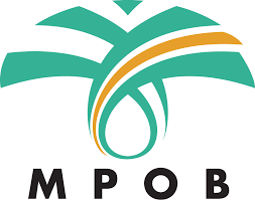
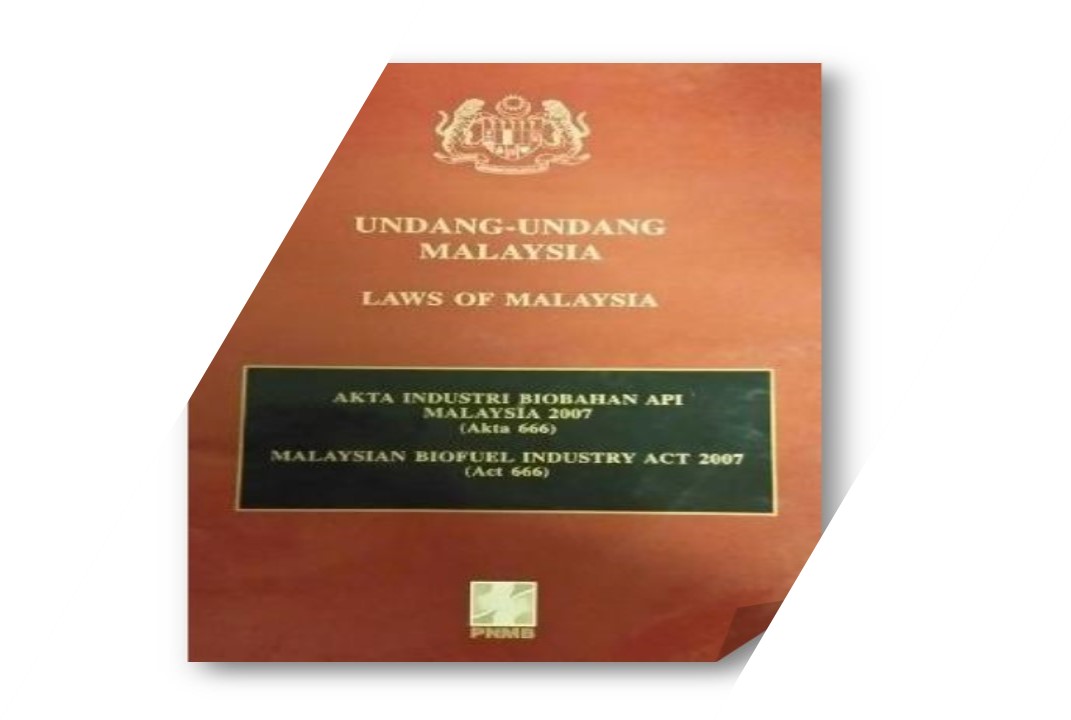
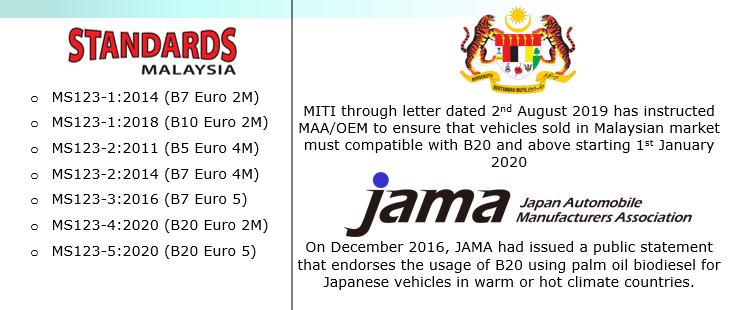


LICENSE APPLICATION PROCESS

Biomass and Biofuel Division
Ministry of Plantation and Commodities (KPK)
No. 15, Level 8, Persiaran Perdana, Precinct 2
Federal Government Administrative Center
62654 PUTRAJAYA
Fax: 03-8887 8354
E-mel: bba[@]kpk.gov.my
LICENSE APPLICATION FORM (PRODUCTION)
LICENSE APPLICATION FORM(SERVICES)
LICENSE APPLICATION FORM(BUSINESS) 

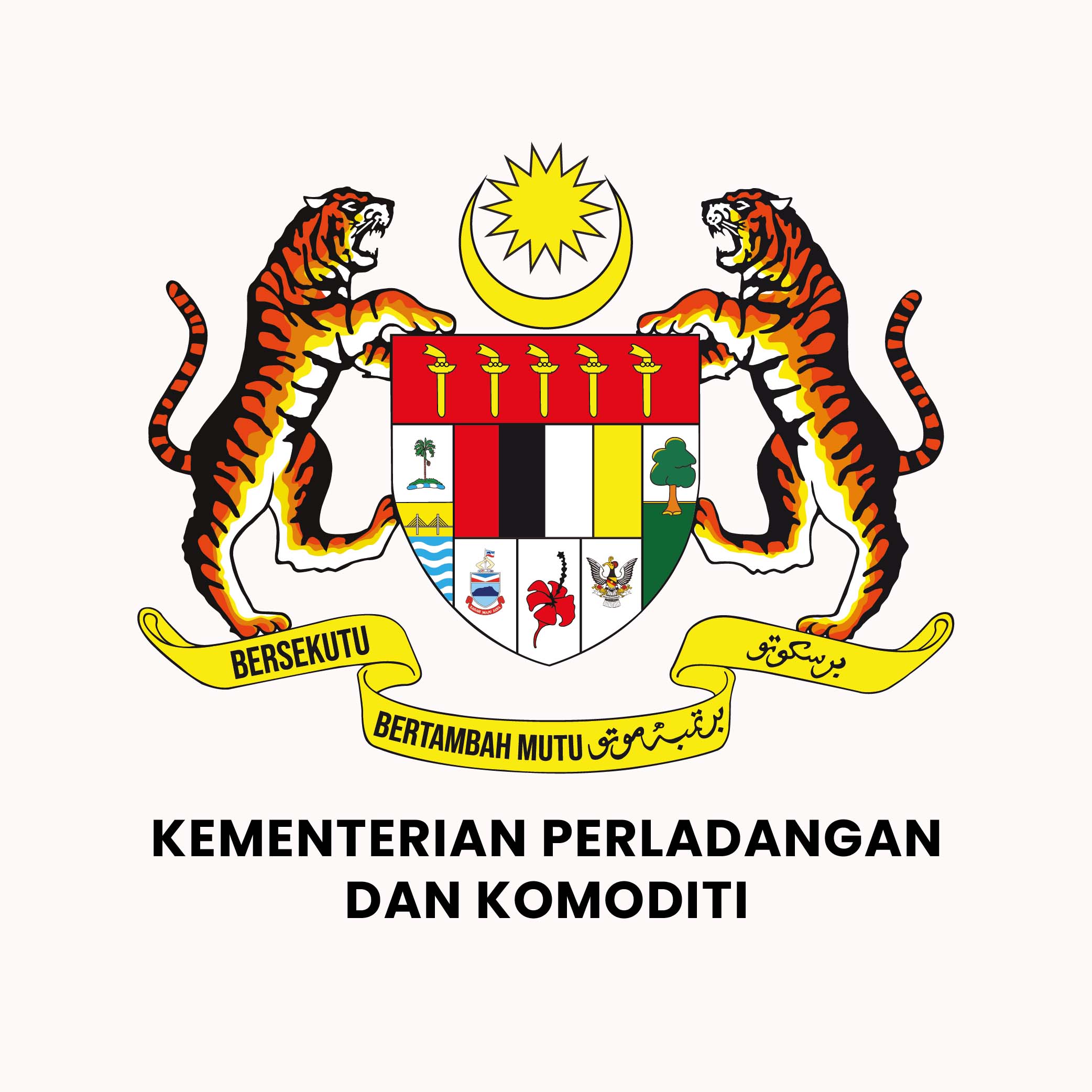 Biomass and Biofuel Division
Biomass and Biofuel Division
Ministry of Plantation and Commodities (KPK)
No. 15, Level 8, Persiaran Perdana, Precinct 2
Federal Government Administrative Center
62654 PUTRAJAYA
Fax: 03-8887 8354
E-mel: bba[@]kpk.gov.my







